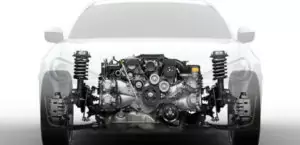The 1.4-liter Volkswagen CMBA 1.4 TSI engine was assembled by the concern from 2012 to 2014 and was installed only on the Golf 7, as well as its platform models Audi A3 and Seat Leon. This unit in a number of markets in 2013 was replaced by an updated version of the CXSA with a different cylinder head.
The EA211 series includes: CWVA, CWVB, CJZA, CJZB, CHPA, CMBA, CXSA, CZCA, CZDA, CZEA, DJKA, DACA, DADA.
Specifications
| Production years | 2012-2014 |
| Displacement, cc | 1395 |
| Fuel system | direct injection |
| Power output, hp | 122 |
| Torque output, Nm | 200 |
| Cylinder block | aluminum R4 |
| Block head | aluminum 16v |
| Cylinder bore, mm | 74.5 |
| Piston stroke, mm | 80 |
| Compression ratio | 10.0 |
| Features | DOHC |
| Hydraulic lifters | yes |
| Timing drive | belt |
| Phase regulator | on the intake shaft |
| Turbocharging | TD025 M2 |
| Recommended engine oil | 5W-30 |
| Engine oil capacity, liter | 3.8 |
| Fuel type | petrol |
| Euro standards | EURO 5 |
| Fuel consumption, L/100 km (for VW Golf 2012) — city — highway — combined |
6.7 4.3 5.3 |
| Engine lifespan, km | ~250 000 |
| Weight, kg | 106 |
The engine was installed on:
- Audi A3 3 (8V) in 2012 – 2014;
- Seat Leon 3 (5F) in 2012 – 2014;
- Volkswagen Golf 7 (5G) in 2012 – 2014.
Disadvantages of the VW CMBA engine
- The first year of production, these power units suffered from oil consumption due to the marriage of the cylinder head;
- Also on specialized forums they complain about a very long warm-up and extraneous noise in operation;
- And there is also a high risk of damaging the ignition coils during the usual replacement of candles;
- The wastegate actuator rod is often wedged and a powerful electric motor breaks it off;
- Plastic pump with two thermostats often leaks and replacement is expensive.






